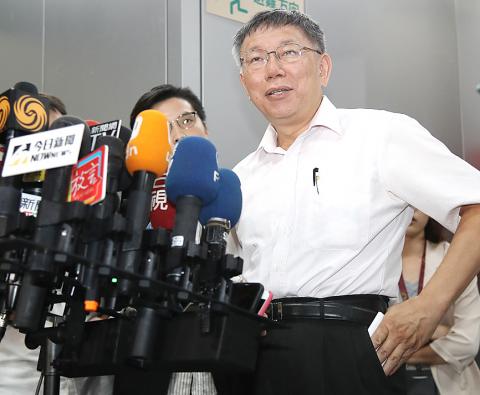Taipei Mayor Ko Wen-je (柯文哲) yesterday said he would not register as an independent candidate in next year’s presidential election, and respects Hon Hai Precision Industry Co founder Terry Gou’s (郭台銘) decision not to run, even though the announcement came as a surprise.
Ko has considered running for a long time, but has always said he would make a decision by yesterday, the Central Election Commission’s deadline to register as an independent candidate.
For the past couple of months, Ko has repeatedly expressed his support for Gou and offered to help him collect petition signatures if he decides to run.

Photo: CNA
“I had originally decided to assist [Gou’s] election campaign, but his decision came too suddenly — I am just as shocked as all of you are,” Ko said.
Gou only informed him about his decision shortly before he announced it to the public, Ko said.
He said he respects Gou’s decision and would not view it as an “assault,” but if Gou had made the decision a month ago, there would have been plenty of time for him to prepare his own bid.
Asked whether Gou had approached him about being his running mate, Ko said that he had long ago rejected the proposal, as he would rather run for president himself and knew it would have been difficult to handle his mayoral duties while running for vice president.
Ko also read a prepared three-page statement responding to Gou’s decision in which he said: “I have never said I would run in next year’s presidential election, but the pan-blue and pan-green camps kept seeing me as an imaginary enemy and putting me in their primary opinion polls.”
“Running for president right after being elected mayor is not a situation that should occur in a normal country, as it would affect municipal administration,” he said, adding that if he could change the political culture in Taipei, it could affect the rest of the nation.
Ko said he was anxious when the presidential candidates of the two major parties were decided, as Taiwan is to get bogged down in a battle between pro-unification and pro-independence ideologies, but what the nation really needs is to improve the efficiency, practicality and performance of its governance.
The election is now to be between the pan-blue and pan-green camps, meaning that it is important for the Taiwan People’s Party (TPP) to win some legislator-at-large seats, so it can become the key minority in the Legislative Yuan, he said.
If the two major parties do not win more than half of the seats in the legislature next year, then TPP legislators could cooperate with both parties to reduce the opposition’s unreasonable opposition and monitor the ruling party’s unscrupulous behavior, Ko said, adding that the TPP would nominate at least 34 candidates for legislator-at-large seats.

Alain Robert, known as the "French Spider-Man," praised Alex Honnold as exceptionally well-prepared after the US climber completed a free solo ascent of Taipei 101 yesterday. Robert said Honnold's ascent of the 508m-tall skyscraper in just more than one-and-a-half hours without using safety ropes or equipment was a remarkable achievement. "This is my life," he said in an interview conducted in French, adding that he liked the feeling of being "on the edge of danger." The 63-year-old Frenchman climbed Taipei 101 using ropes in December 2004, taking about four hours to reach the top. On a one-to-10 scale of difficulty, Robert said Taipei 101

Taiwanese and US defense groups are collaborating to introduce deployable, semi-autonomous manufacturing systems for drones and components in a boost to the nation’s supply chain resilience. Taiwan’s G-Tech Optroelectronics Corp subsidiary GTOC and the US’ Aerkomm Inc on Friday announced an agreement with fellow US-based Firestorm Lab to adopt the latter’s xCell, a technology featuring 3D printers fitted in 6.1m container units. The systems enable aerial platforms and parts to be produced in high volumes from dispersed nodes capable of rapid redeployment, to minimize the risk of enemy strikes and to meet field requirements, they said. Firestorm chief technology officer Ian Muceus said

MORE FALL: An investigation into one of Xi’s key cronies, part of a broader ‘anti-corruption’ drive, indicates that he might have a deep distrust in the military, an expert said China’s latest military purge underscores systemic risks in its shift from collective leadership to sole rule under Chinese President Xi Jinping (習近平), and could disrupt its chain of command and military capabilities, a national security official said yesterday. If decisionmaking within the Chinese Communist Party has become “irrational” under one-man rule, the Taiwan Strait and the regional situation must be approached with extreme caution, given unforeseen risks, they added. The anonymous official made the remarks as China’s Central Military Commission Vice Chairman Zhang Youxia (張又俠) and Joint Staff Department Chief of Staff Liu Zhenli (劉振立) were reportedly being investigated for suspected “serious

American climber Alex Honnold is to attempt a free climb of Taipei 101 today at 9am, with traffic closures around the skyscraper. To accommodate the climb attempt and filming, the Taipei Department of Transportation said traffic controls would be enforced around the Taipei 101 area. If weather conditions delay the climb, the restrictions would be pushed back to tomorrow. Traffic controls would be in place today from 7am to 11am around the Taipei 101 area, the department said. Songzhi Road would be fully closed in both directions between Songlian Road and Xinyi Road Sec 5, it said, adding that bidirectional traffic controls would